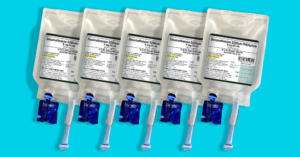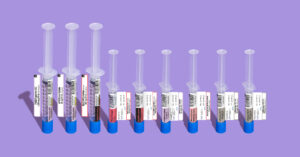Hoje em dia, empresa farmacêutica adiciona cada vez mais RFID médico aos produtos hospitalares.
Apply RFID
Fagron Sterile Services (FSS), uma empresa farmacêutica, disse que. Starting in February 2022, it plans to apply RFID technology to some single-use drugs in the medical industry. Using an RFID system from Kit Check. The hospital can automatically capture data about these products and track inventory, expiration dates and recalls.
At FSS’ manufacturing facility in Wichita, Kansas. UHF medical Tags RFID embed in select product labels to better provide customers. with a more automated drug inventory management solution.
First Time
Glen Olsheim, vice president of business and new product development at FSS. Said the benefits for those who track products through medical RFID for the first time. In managing inventory, identifying expiration dates and improving customer engagement in the healthcare industry. Greater accuracy in inventory. Ao mesmo tempo, RFID tags apply to products hospital receive. Which can save manual operations.
Normalmente, compounding pharmacies combine, remix. Or alter the active ingredients and additives of standard medicines base on a patient’s specific needs. No entanto, facilities as 503B (Provisions for Outsourced Site Formulation of Formulations). Operate on a much larger scale and follow standards to validate each process against current Good Manufacturing Practice.
What Includes
FSS is a U.S. Food and Drug Administration (Fda)-registered 503B outsourcing facility that primarily provides sterile medications. Including ready-to-use IV bags and syringes for pain relief, ophthalmology, dialysis, and urology, as well as other treatments. It entered the U.S. drug market in 2010, selling directly to hos
pitals or doctors.
Olsom explained that FSS provides medicines to millions of patients around the world each year. Recentemente, some of the company’s customers have passive medical RFID UHF tags built into product labels. So that they can be automatically read by Kit Check’s RFID scanning station. (Often referred to as a “blue box”) when the drug is received by the hospital.
Some medical institutions refuse to use FSS products simply because it does not apply RFID tags.
Hospital Grows
Lori Murphy, Kit Check’s portfolio director, noted that the use of medical RFID technology in hospitals is growing. Na verdade, to date, this growth in medical institutions has outpaced the adoption rate. Some hospitals are applying RFID tags by hand. because it is difficult to find compounders who incorporate RFID tags into their products. This is a time-consuming process that can slow down the work of medical professionals and reduce efficiency.
“There is an entire workflow in the hospital to manually apply these tags. Which is time-consuming but still has to do it. Because not every item has an RFID tag,” Murphy said.
Challenges
FSS started working with Kit Check to create a solution in 2020. “The goal is clear, we do believe in RFID technology,” Olsom said. “Our goal is to make our customers work more efficiently. And RFID plays a very important role in improving their efficiency. Without this technology, it would be possible to Mistakes of all kinds can occur. Such as choosing the wrong drug, or mislabeling it, using an expired drug incorrectly. Causing unnecessary waste and even health risks. These challenges pervade the industry.”
Human
error can occur in identifying and distinguishing products like phenylephrine, epinephrine, and ephedrine. Even though these drug names are all too familiar to fast-moving medical industry users or pharmacists. “You’re always running the risk that one of them, people might confused or misinterpreted them,” Olsom said. Plus, there’s the challenge of discerning the number of products. The anesthetist may not have the opportunity to double-check the milliliters for a particular unit. or to confirm that they match the medicine cabinet required for a particular procedure.
Data
Medication misidentification and patient care are the top priorities of FSS. No entanto, the company also wants to ensure its customers have access to inventory data. to help identify items that need restocking or need to be used before expiration. And RFID provides an effective solution.
As the new technology deploys, FSS will apply RFID product labels created by its label converters. The unique ID number encoded on each RFID tag will be associated with data. Such as expiration date, national drug code and serial number. Which stored in Kit Check’s cloud software.
How It Works
FSS is marking the 10 most commonly prescribed drugs in the operating room for customers with Kit Check technology. As syringes are filled on the assembly line. Those for RFID tags are transferred to a dedicated conveyor belt. FSS installs an RFID reading tunnel with a built-in Impinj reader at the end of each assembly line or conveyor belt. Which can be easily moved according to production needs. Labeled products are packaged in boxes or bags. And a reader then interrogates each drug’s label while scanning a barcode on its packaging to associate a specific package with a specific product.
This information can compared with data indicating what products should be included in each package. Kit Check’s software then identifies if there are product packaging errors. Por exemplo, if a syringe is missing. When a hospital receives a product. They can read the label through a scanning station and automatically access the relevant data. Or they can use the label to confirm when the medication delivered to the operating room or other area. Ensuring that medication is not being delivered to the wrong patient or use after expiration.
Capabilities
Building RFID capabilities in the manufacturing process required some deployment, Olsom recalls. “Drug makers know this is an extremely complex production process. Which contrasts with more standard manufacturing. Every procedure is unique, and every new batch of medicine requires an interdisciplinary team to handle.”
Regarding building RFID capabilities into product lines. The company chose to keep all of its existing drug assembly methods, with RFID-specific post-production steps.
A longo prazo, the FSS hopes to exchange data with hospital pharmacies. To gain insights into how quickly drugs are being consumed. and when they need to be replenished. Olsom explained that FSS can use this data to more proactively deliver necessary products. “Our sales team, working with Kit Check, can be more proactive in tracking orders. And confirming that the stock ordered can meet customer needs. Which helps us maintain production lines and ensure efficient service to our customers.”
Further
Finalmente, Murphy hopes that RFID technology will also further automate item-level identification in the supply chain. Por exemplo, drug manufacturers are interested in using RFID to prevent drug diversion. If a wholesaler or distributor reads the tags. Drug manufacturers will be able to confirm that the drug is destined for the intend customer.
For FSS, the implementation of RFID will better serve existing customers and attract new ones. “This will make our customers safer and more efficient. And we’ve waited too long because we didn’t have the technology. And missed a lot of opportunities to acquire new customers.” Olsom said, buying FSS syringes and doing them. The percentage of customers who label by hand is very high. “Então, we need to make improvements … the point is, the technology has to be worth it.”








